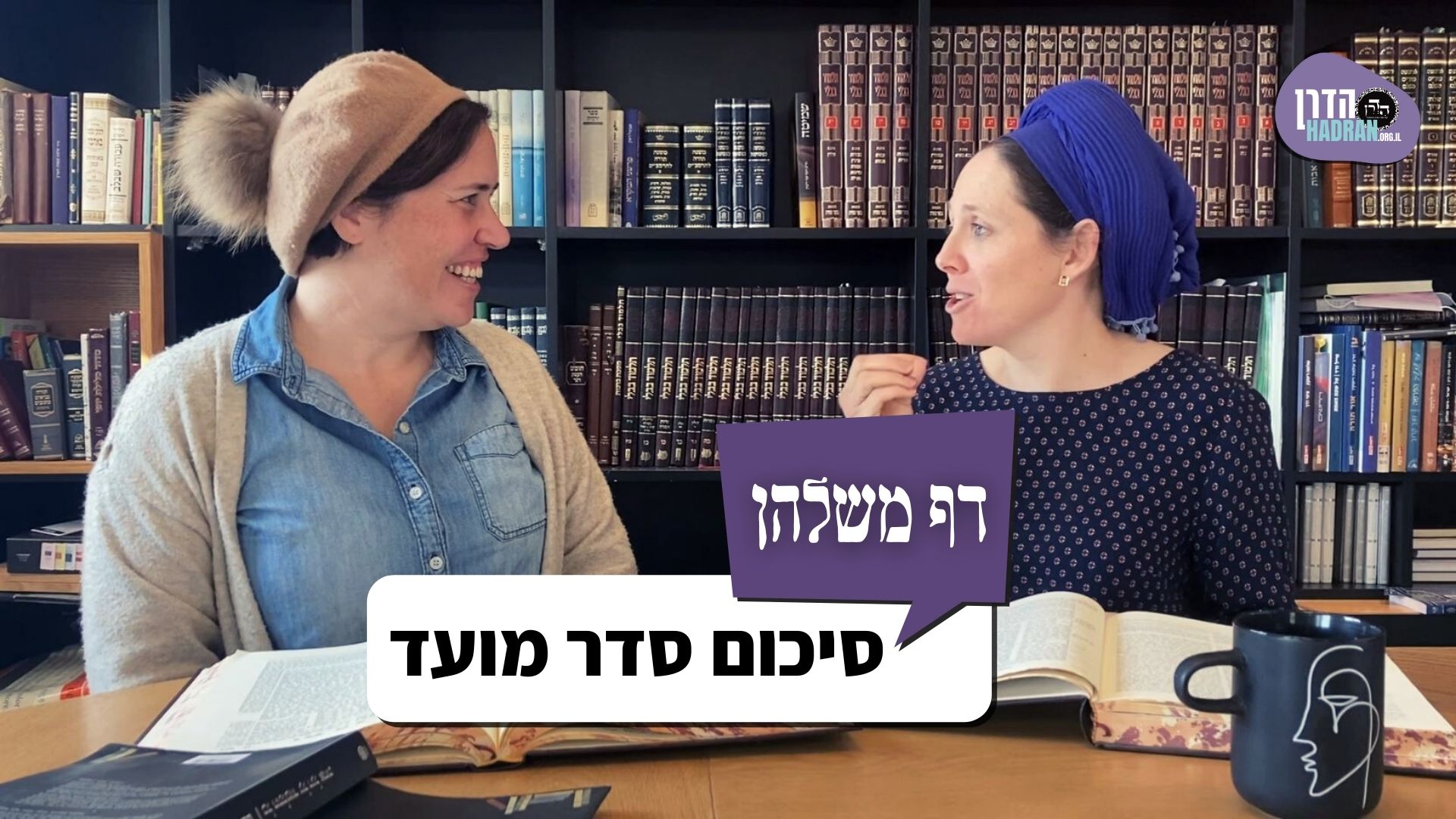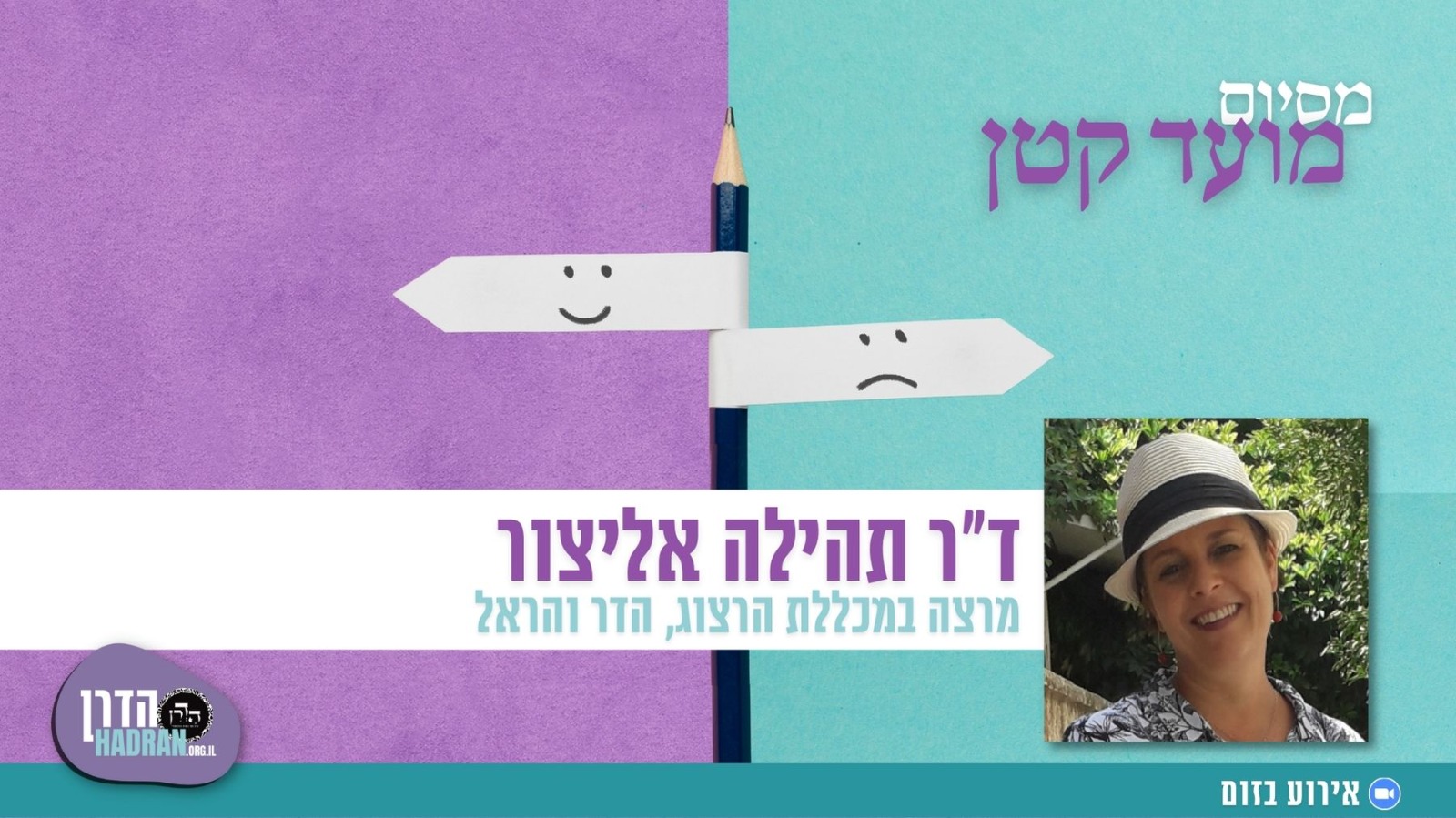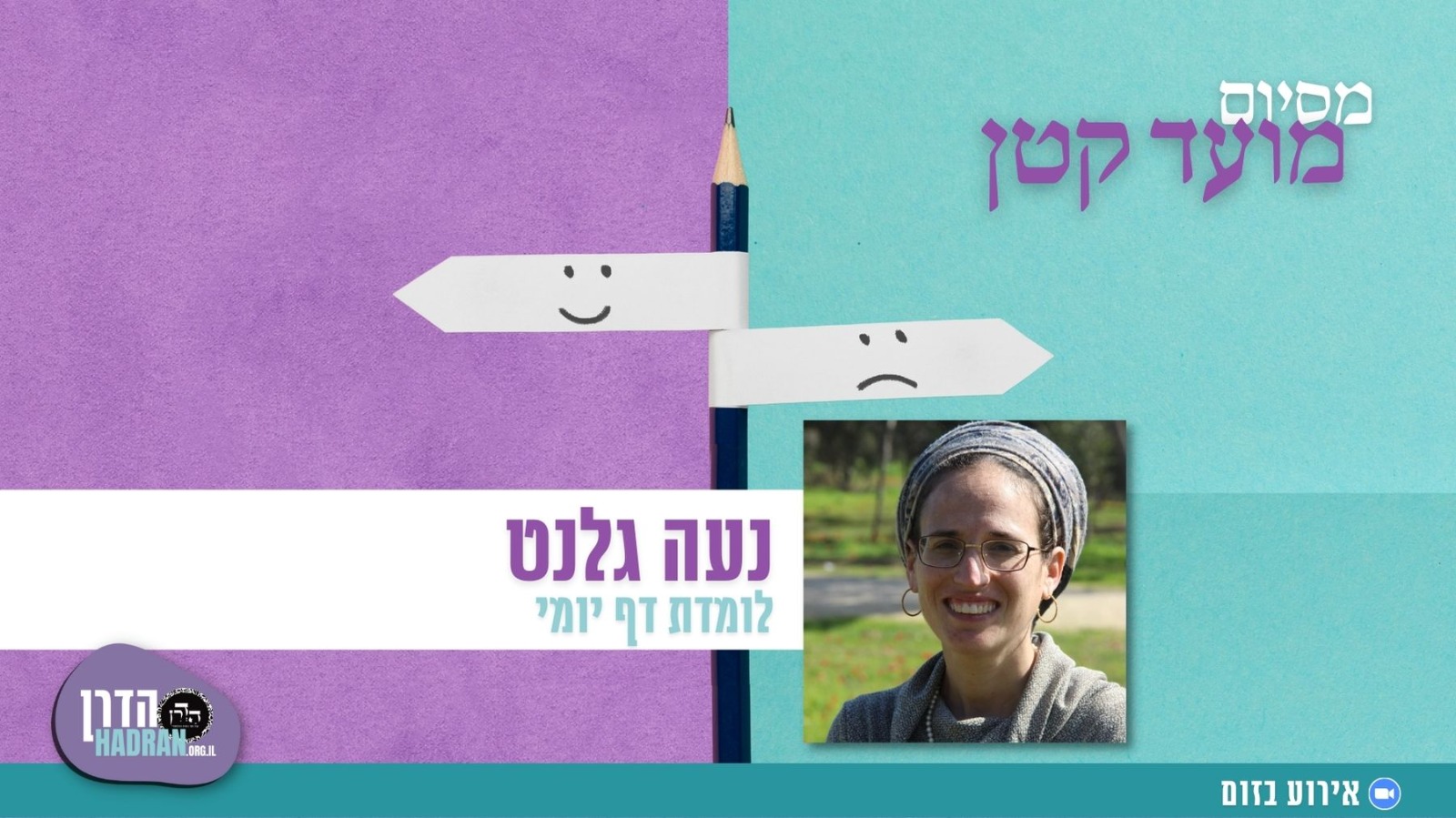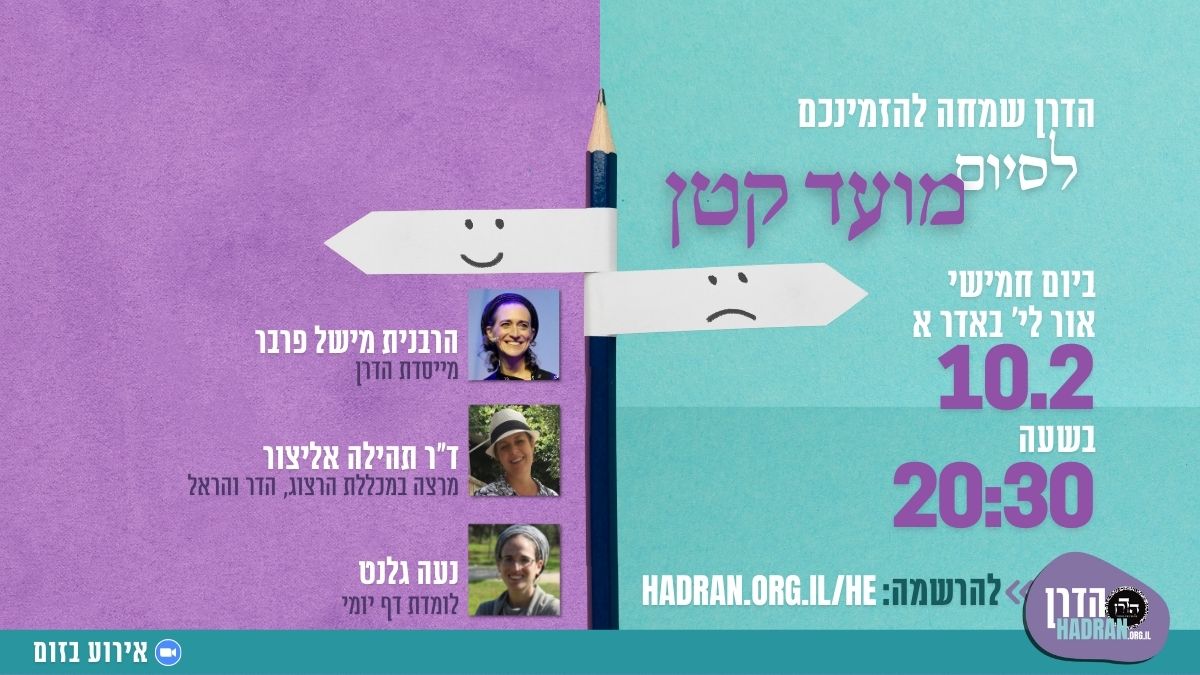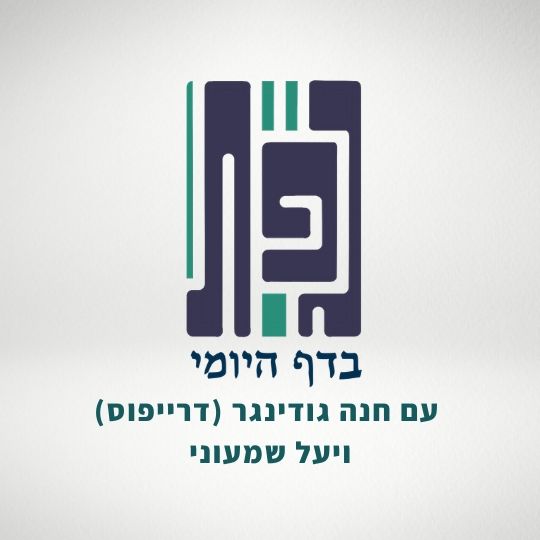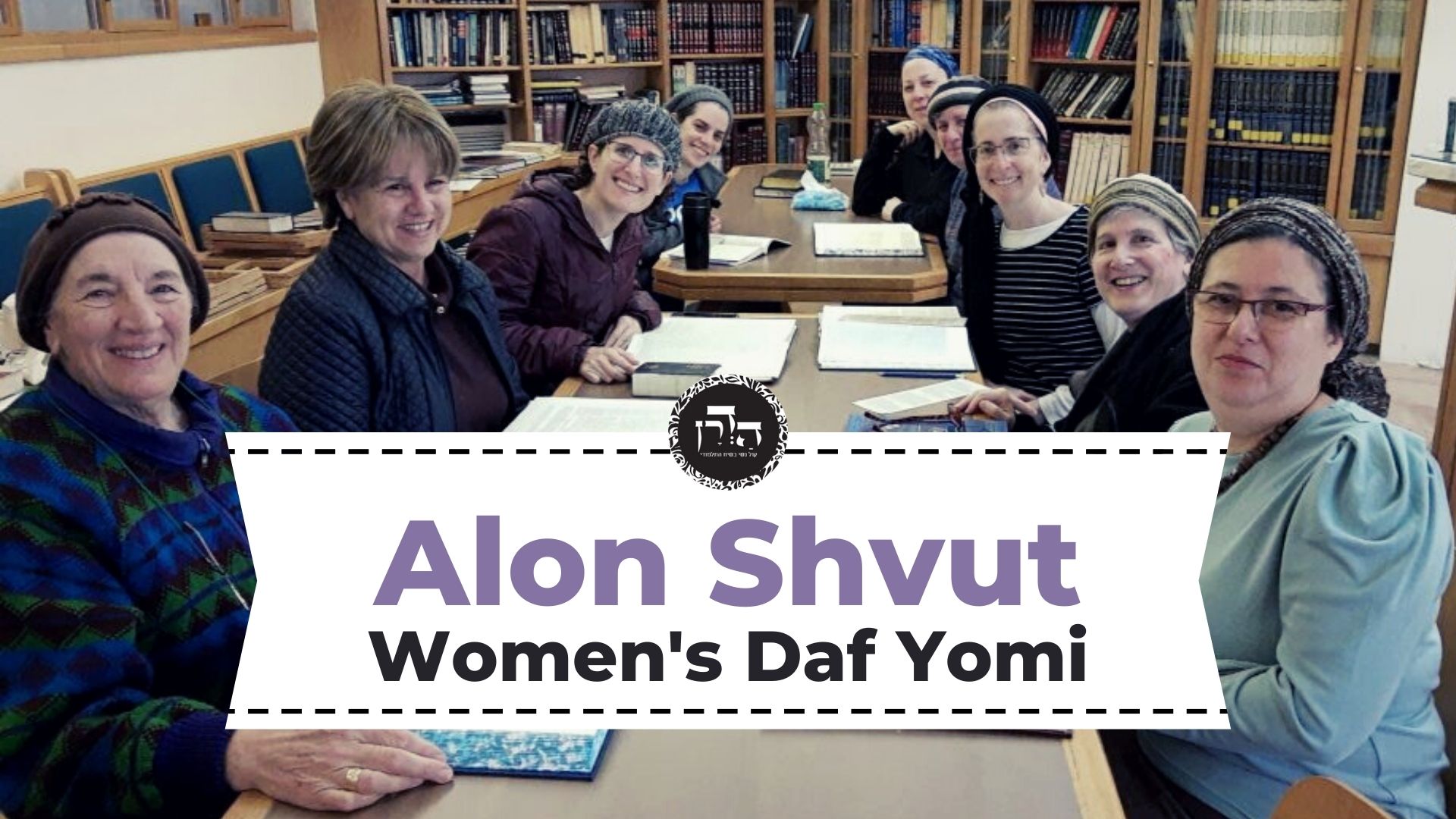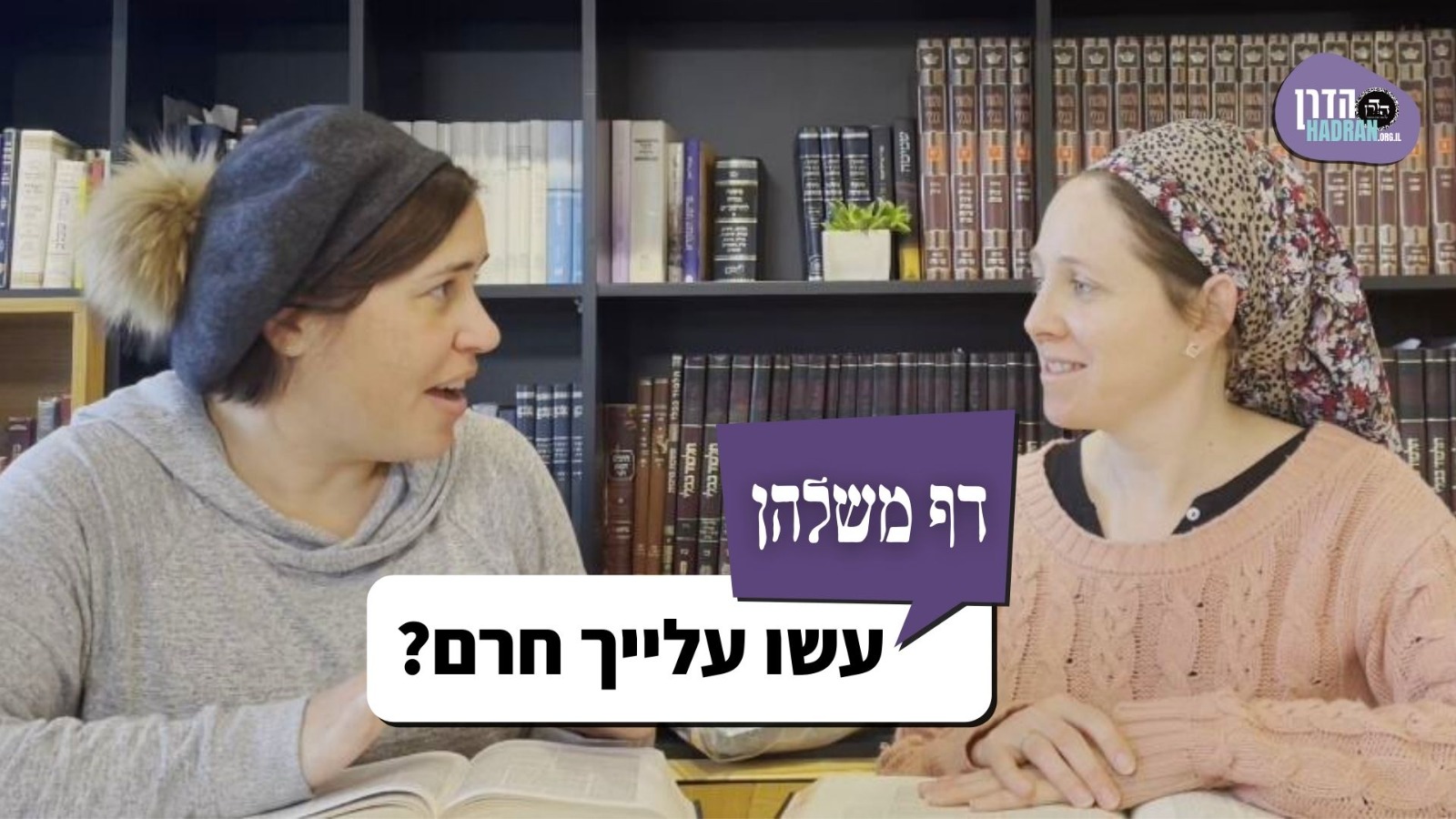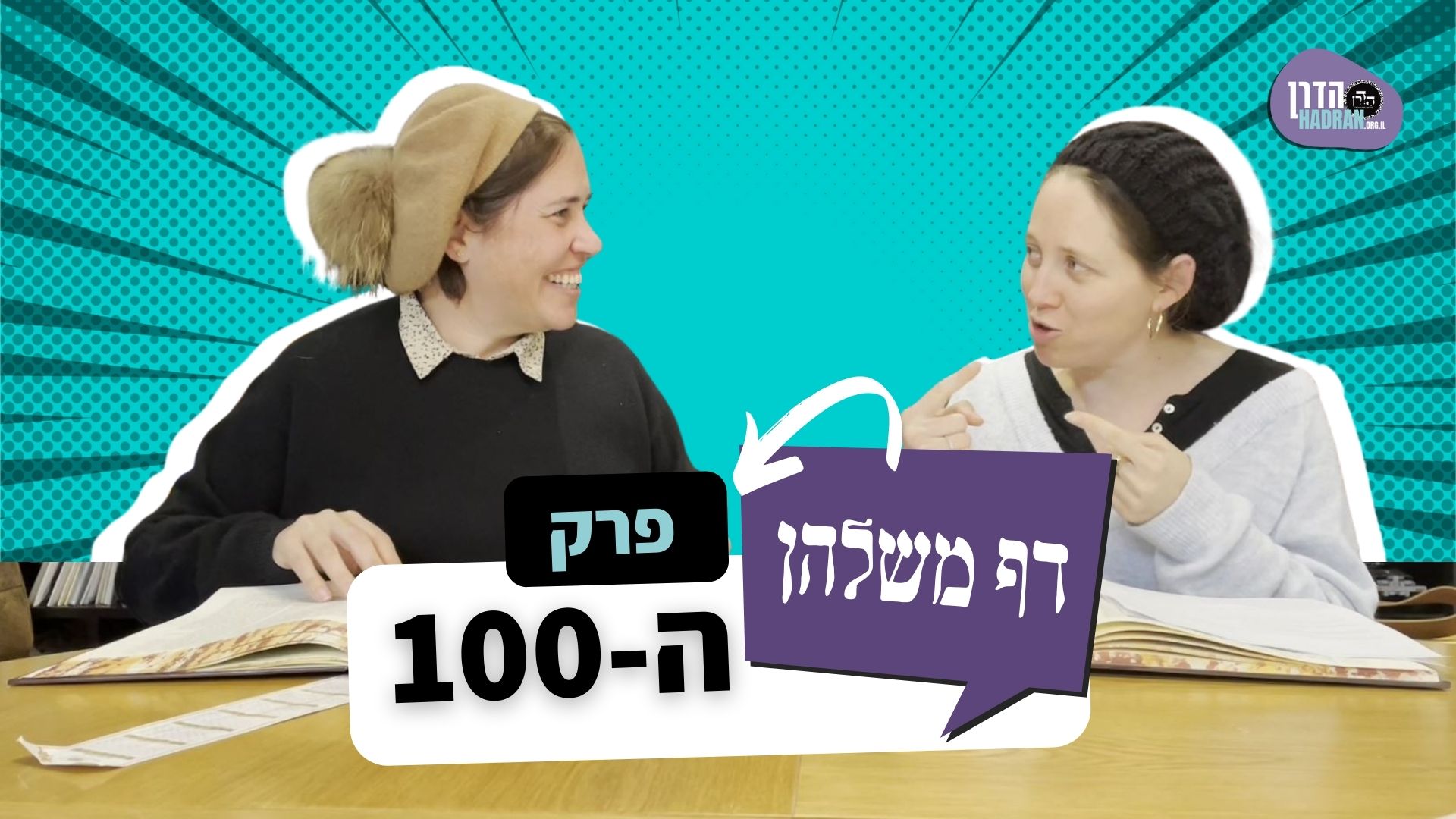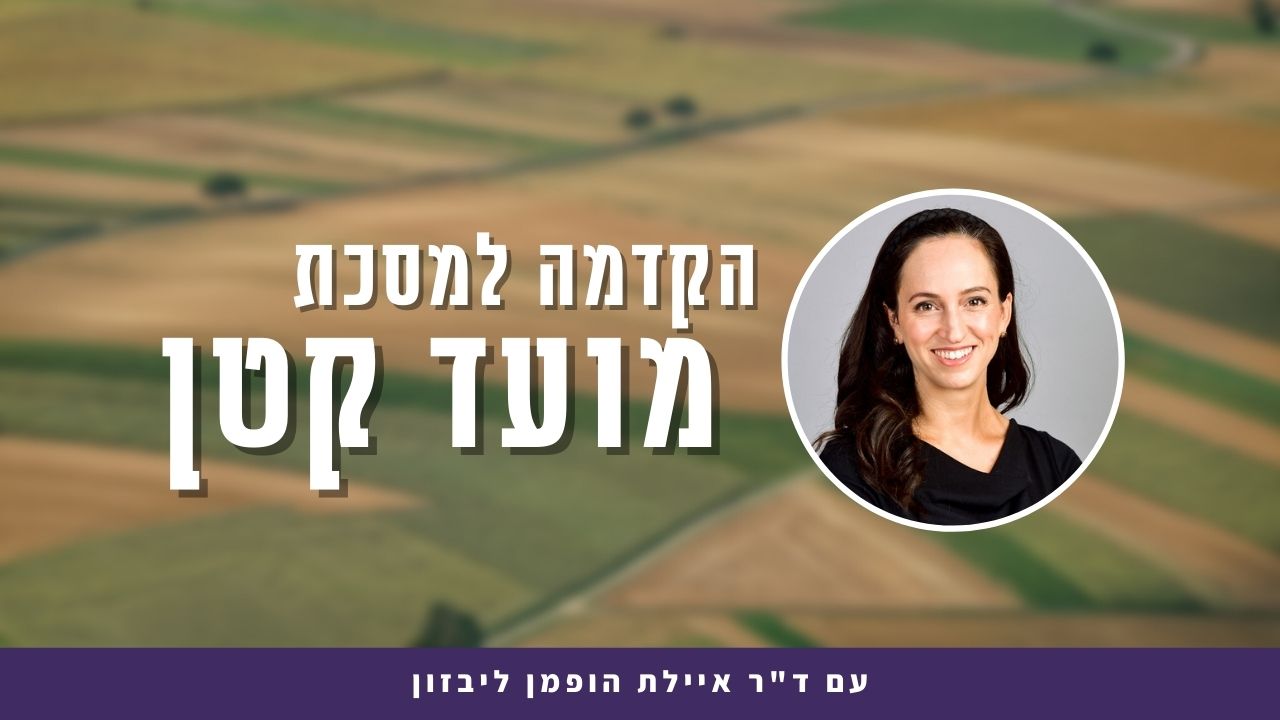מועד קטן ז
עַד כַּמָּה — עַד פַּרְסָה.
Up to what distance are the ant holes considered to be adjacent such that a river is required in order to separate between them? Up to a parasang [parsa].
רַבִּי יְהוּדָה אוֹמֵר: מִשְּׂדֵה הָאִילָן כְּדַרְכּוֹ, וּמִשְּׂדֵה הַלָּבָן שֶׁלֹּא כְּדַרְכּוֹ. תָּנוּ רַבָּנַן: כֵּיצַד כְּדַרְכּוֹ? חוֹפֵר גּוּמָּא וְתוֹלֶה בָּהּ מְצוּדָה. כֵּיצַד שֶׁלֹּא כְּדַרְכּוֹ? נוֹעֵץ שַׁפּוּד וּמַכֶּה בְּקוּרְדּוֹם וּמְרַדֶּה הָאֲדָמָה מִתַּחְתֶּיהָ.
§ We learned in the mishna that Rabbi Yehuda says: In an orchard one may trap moles and mice in his usual manner, but in a field of grain, he may trap them only in a way that is not his usual manner. The Sages taught the following baraita: How does one trap in his usual manner? He digs a hole in the ground and hangs a trap in it. How does one trap in a way that is not his usual manner? He inserts a spit into the ground where the rodents are suspected of hiding, strikes it with a spade, and removes the earth from beneath it until he finds and kills the rodents.
תַּנְיָא, רַבִּי שִׁמְעוֹן בֶּן אֶלְעָזָר אוֹמֵר: כְּשֶׁאָמְרוּ מִשְּׂדֵה לָבָן שֶׁלֹּא כְּדַרְכּוֹ, לֹא אָמְרוּ אֶלָּא בִּשְׂדֵה לָבָן הַסְּמוּכָה לָעִיר, אֲבָל בִּשְׂדֵה לָבָן הַסְּמוּכָה לִשְׂדֵה הָאִילָן — אֲפִילּוּ כְּדַרְכּוֹ, שֶׁמָּא יֵצְאוּ מִשְּׂדֵה הַלָּבָן וְיַחְרִיבוּ אֶת הָאִילָנוֹת.
It is taught in a baraita that Rabbi Shimon ben Elazar says: When they said that one may trap moles and mice in a field of grain on the intermediate days of a Festival only in a way that is not his usual manner, they spoke only with regard to a field of grain that is adjacent to the city, where the damage is limited to that field and is not extensive. But in a field of grain that is adjacent to an orchard, one may trap even in his usual manner, lest the moles and mice leave the field of grain and destroy the trees in the adjacent orchard, causing great damage.
וּמְקָרִין אֶת הַפִּירְצָה בַּמּוֹעֵד. כֵּיצַד מְקָרִין? רַב יוֹסֵף אָמַר: בְּהוּצָא וְדַפְנָא.
§ It is taught in the mishna: And one may seal a breach in the wall of his garden on the intermediate days of a Festival. The Gemara asks: How does one seal such a breach? Rav Yosef said: With palm branches [hutza] and the branches of a bay tree [dafna], which do not create a significant partition, but simply a temporary barrier.
בְּמַתְנִיתָא תָּנָא: צָר בִּצְרוֹר, וְאֵינוֹ טָח בְּטִיט. אָמַר רַב חִסְדָּא: לֹא שָׁנוּ אֶלָּא כּוֹתֶל הַגִּינָה, אֲבָל כּוֹתֶל הֶחָצֵר — בּוֹנֶה כְּדַרְכּוֹ.
It was taught in a baraita: One fills in the breach with stone, but he does not plaster the stones with clay. Rav Ḥisda said: They taught that he may seal a breach but not build a wall in his usual manner only with regard to the wall of a garden, as no significant loss will be suffered if he delays building until after the Festival. However, with regard to the wall of a courtyard, which prevents the entry of strangers who are likely to steal from him, he may build a wall in his usual manner even on the intermediate days of a Festival.
לֵימָא מְסַיַּיע לֵיהּ: כּוֹתֶל הַגּוֹחֶה לִרְשׁוּת הָרַבִּים — סוֹתֵר וּבוֹנֶה כְּדַרְכּוֹ מִפְּנֵי הַסַּכָּנָה. הָתָם כִּדְקָתָנֵי טַעְמָא — מִפְּנֵי הַסַּכָּנָה.
The Gemara suggests: Let us say that the following baraita supports Rav Ḥisda’s statement: With regard to a wall that is leaning [goḥeh] toward the public domain and is likely to fall, one may demolish and rebuild it in his usual manner on the intermediate days of a Festival, due to the danger that it poses to passersby. The Gemara rejects this opinion: There, the reason is as the baraita explicitly teaches, i.e., it is due to the danger that the wall poses to passersby, and not due to the protection that it affords the courtyard.
וְאִיכָּא דְּאָמְרִי, תָּא שְׁמַע: כּוֹתֶל הַגּוֹחֶה לִרְשׁוּת הָרַבִּים — סוֹתֵר וּבוֹנֶה כְּדַרְכּוֹ מִפְּנֵי הַסַּכָּנָה. מִפְּנֵי הַסַּכָּנָה — אִין, שֶׁלֹּא מִפְּנֵי הַסַּכָּנָה — לָא. לֵימָא תֶּיהְוֵי תְּיוּבְתֵּיהּ דְּרַב חִסְדָּא?
And some say that this baraita was cited not to support Rav Ḥisda’s opinion but in order to refute it, as follows: Come and hear that which is taught in a baraita: With regard to a wall that is leaning toward the public domain and is likely to fall, one may demolish and rebuild it in his usual manner, due to the danger that it poses to passersby. The Gemara explains: The baraita indicates that if the need to build the wall is due to the danger that it poses, yes, he is permitted to rebuild the wall, but if the reason is not due to the danger, no, he is not permitted to do so. Shall we say that this is a conclusive refutation of the opinion of Rav Ḥisda, who says that one may build the wall of his courtyard in his usual manner, even if no danger is present?
אָמַר לְךָ רַב חִסְדָּא: הָתָם סוֹתֵר וּבוֹנֶה, הָכָא בּוֹנֶה וְלֹא סוֹתֵר.
The Gemara answers: Rav Ḥisda could have said to you: There, in the case where the existing wall poses a danger, he is even permitted to demolish the wall and build it from scratch. Here, in the case of an ordinary wall enclosing a courtyard, he is permitted to build the breached wall in the usual manner, but not to demolish it.
הָתָם נָמֵי, לִיסְתּוֹר וְלָא לִיבְנֵי! אִם כֵּן, מִימְּנַע וְלָא סוֹתַר.
The Gemara asks: There too, in the case of the leaning wall, let us say that he is permitted to demolish it and thereby remove the danger, but not to rebuild it until after the Festival. The Gemara answers: If so, he might refrain even from demolishing it, as demolishing the wall would leave his courtyard unprotected. Therefore, to eliminate the danger posed by the leaning wall, he is permitted not only to demolish it, but to rebuild it as well.
אָמַר רַב אָשֵׁי: מַתְנִיתִין נָמֵי דַּיְקָא, דְּקָתָנֵי: וּבַשְּׁבִיעִית בּוֹנֶה כְּדַרְכּוֹ.
Rav Ashi said: The wording of the mishna is also precise and indicates that it is referring to the wall of a garden, as understood by Rav Ḥisda, as it teaches: During the Sabbatical Year one may even build in his usual manner.
דְּהֵיכָא? אִילֵּימָא דְּחָצֵר, צְרִיכָא לְמֵימַר? אֶלָּא לָאו, דְּגִינָּה. וְאַף עַל גַּב דְּמִיחֲזֵי כְּמַאן דְּעָבֵיד נְטִירוּתָא לְפֵירֵי. שְׁמַע מִינַּהּ.
The Gemara clarifies: Where is the wall to which the mishna refers? If we say that the mishna is referring to the wall of a courtyard, need it be said that it may be built during the Sabbatical Year? Only agricultural labors are prohibited during the Sabbatical Year, but construction is permitted. Rather, is it not referring to the wall of a garden, and it was necessary to state that this wall may be built during the Sabbatical Year to indicate that even though he appears as one who is building a protection for his produce, he is nevertheless permitted to do so. This proves that the mishna’s discussion pertains to building the wall of a garden. The Gemara concludes: Learn from this that Rav Ḥisda’s interpretation is indeed the correct understanding of the mishna.
מַתְנִי׳ רַבִּי מֵאִיר אוֹמֵר: רוֹאִין אֶת הַנְּגָעִים בַּתְּחִילָּה לְהָקֵל, אֲבָל לֹא לְהַחְמִיר. וַחֲכָמִים אוֹמְרִים: לֹא לְהָקֵל וְלֹא לְהַחְמִיר.
MISHNA: When symptoms of leprosy appear, they must be examined by a priest, who determines whether or not the symptoms qualify as leprosy. Rabbi Meir says: A priest may initially examine an individual showing symptoms of leprosy on the intermediate days of a Festival in order to be lenient, i.e., he may pronounce the individual to be free of leprosy, but not in order to be stringent; he may not pronounce the individual to be impure. The individual does not become ritually impure until the priest pronounces him to have leprosy, and therefore the priest may remain silent and thereby prevent causing the afflicted individual distress during the Festival. And the Rabbis say: The priest may not examine the symptoms in order to be lenient or in order to be stringent.
גְּמָ׳ תַּנְיָא, רַבִּי מֵאִיר אוֹמֵר: רוֹאִין אֶת הַנְּגָעִים לְהָקֵל, אֲבָל לֹא לְהַחְמִיר. רַבִּי יוֹסֵי אוֹמֵר: לֹא לְהָקֵל וְלֹא לְהַחְמִיר. שֶׁאִם אַתָּה נִזְקָק לוֹ לְהָקֵל — [אַתָּה] נִזְקָק לוֹ אַף לְהַחְמִיר.
GEMARA: It is taught in a baraita: Rabbi Meir says: A priest may examine an individual showing symptoms of leprosy on the intermediate days of a Festival in order to be lenient, but not in order to be stringent. Rabbi Yosei says: The priest may not examine the symptoms to be lenient or to be stringent. The reasoning behind Rabbi Yosei’s opinion is that if you attend to the individual with the symptoms of leprosy to be lenient, you must attend to him even to be stringent. If the priest sees that the symptom is in fact leprosy, he must declare the affected person ritually impure rather than remain silent. Consequently, in order to avoid declaring that he has leprosy on the Festival, the priest should not examine him at all.
אָמַר רַבִּי: נִרְאִין דִּבְרֵי רַבִּי מֵאִיר בְּמוּסְגָּר, וְדִבְרֵי רַבִּי יוֹסֵי בְּמוּחְלָט.
Rabbi Yehuda HaNasi said: The statement of Rabbi Meir appears to be correct with regard to the case of a quarantined leper. In this case, the priest may reexamine him at the end of the week even on the intermediate days of a Festival, because if he declares the individual to be pure, he will cause him to rejoice, and if he declares that the individual must be quarantined for another week, his situation is no worse than it was previously. On the other hand, the statement of Rabbi Yosei appears to be correct with regard to the case of a confirmed leper, one who has already been declared conclusively impure by a priest. The Gemara (7b) will explain the reason for this statement.
אָמַר רָבָא: בְּטָהוֹר כּוּלֵּי עָלְמָא לָא פְּלִיגִי דְּלָא חָזוּ לֵיהּ. בְּהֶסְגֵּר רִאשׁוֹן דְּכוּלֵּי עָלְמָא לָא פְּלִיגִי דְּחָזֵי לֵיהּ. כִּי פְּלִיגִי,
Rava said: With regard to an individual with symptoms of leprosy who is still ritually pure, i.e., who has not yet been examined by a priest, everyone agrees that the priest does not examine him, as his status can only worsen due to the examination. With regard to a suspected leper who is in his first week of quarantine, everyone agrees that the priest examines him, as the priest may declare him pure if his symptoms have subsided, and even if his symptoms remained as they were, he will simply be quarantined for another week. When they disagree
בְּהֶסְגֵּר שֵׁנִי. מָר סָבַר: בְּכֹהֵן תַּלְיָא מִילְּתָא. אִי טָהוֹר — אָמַר לֵיהּ ״טָהוֹר״, וְאִי טָמֵא — שָׁתֵיק. וּמָר סָבַר: ״לְטַהֲרוֹ אוֹ לְטַמְּאוֹ״ כְּתִיב.
it is with regard to a suspected leper who is already in his second week of quarantine. One Sage, Rabbi Meir, holds that the matter depends upon the discretion of the priest; if he is found ritually pure, the priest declares him pure, and if he is found ritually impure, the priest can remain silent. As long as the priest does not declare the affected individual ritually impure, he does not become impure. And one Sage, Rabbi Yosei, holds that since it is written: “This is the law of the plague of leprosy…to pronounce it pure or to pronounce it impure” (Leviticus 13:59), the priest is not permitted to be silent; just as he is obligated to declare him pure when that is the case, so too, he is bound to declare him impure when his symptoms indicate impurity.
אָמַר מָר, אָמַר רַבִּי: נִרְאִין דִּבְרֵי רַבִּי יוֹסֵי בְּמוּחְלָט, וְדִבְרֵי רַבִּי מֵאִיר בְּמוּסְגָּר. וְהָתַנְיָא אִיפְּכָא!
The Gemara proceeds to analyze the baraita. The Master said that Rabbi Yehuda HaNasi said: The statement of Rabbi Yosei appears correct with regard to a confirmed leper, and the statement of Rabbi Meir appears correct with regard to a quarantined leper. The Gemara raises an objection: But isn’t the opposite taught in a different baraita, namely, that Rabbi Yosei’s statement appears correct with regard to the case of a quarantined leper, while Rabbi Meir’s statement appears correct with regard to the case of a confirmed leper?
תַּנָּאֵי הִיא אַלִּיבָּא דְּרַבִּי. מָר סָבַר: צַוְותָּא דְעָלְמָא עֲדִיף לֵיהּ.
The Gemara answers: This is a dispute between tanna’im in accordance with the opinion of Rabbi Yehuda HaNasi. One Sage, the author of the latter baraita, holds that the company of the world at large is preferable to the leper. Consequently, the priest may examine a confirmed leper during the Festival because the priest will either decide that the leper’s symptoms are still present, in which case the leper’s situation will be no worse than before, or the priest will declare that his symptoms have subsided, in which case the leper may reenter the community, which will bring him joy.
וּמָר סָבַר: צַוְותָּא דְאִשְׁתּוֹ עֲדִיפָא לֵיהּ.
And one Sage, the author of the baraita (7a), holds that the company of his wife is preferable to the leper. Consequently, the priest may not examine a confirmed leper on the Festival, because if he declares that his symptoms have subsided, the leper will begin his seven day purification process, during which time he is prohibited from engaging in conjugal relations with his wife. Due to the distress that this causes him, it is preferable that the priest not examine him at all during the Festival.
לְמֵימְרָא דְּמוּחְלָט מוּתָּר בְּתַשְׁמִישׁ הַמִּטָּה? אִין, וְהָתַנְיָא: ״וְיָשַׁב מִחוּץ לְאׇהֳלוֹ שִׁבְעַת יָמִים״, שֶׁיְּהֵא אָסוּר בְּתַשְׁמִישׁ הַמִּטָּה. וְאֵין ״אׇהֳלוֹ״ אֶלָּא אִשְׁתּוֹ, שֶׁנֶּאֱמַר: ״לֵךְ אֱמוֹר לָהֶם שׁוּבוּ לָכֶם לְאׇהֳלֵיכֶם״. רַבִּי יְהוּדָה אוֹמֵר: ״שִׁבְעַת יָמִים יִסְפְּרוּ לוֹ״, יְמֵי סְפִירוֹ וְלֹא יְמֵי חִלּוּטוֹ.
The Gemara asks: Is this to say that a confirmed leper is permitted to engage in conjugal relations with his wife? The Gemara answers: Yes, and so too it is taught in a baraita: With regard to a leper who is counting his seven days, it is written: “But he shall remain outside his tent seven days” (Leviticus 14:8). This verse teaches that the leper is prohibited from engaging in conjugal relations, as the words his tent refer only to his wife, as it is stated: “Go, say to them: Return again to your tents” (Deuteronomy 5:27). Rabbi Yehuda says: The verse states: “And after he is cleansed, they shall count for him seven days” (Ezekiel 44:26), indicating that he is prohibited from having conjugal relations during the days of his counting, but not during the days of his confirmed leprosy.
רַבִּי יוֹסֵי בְּרַבִּי יְהוּדָה אוֹמֵר: שִׁבְעָה יְמֵי סְפִירוֹ, קַל וָחוֹמֶר לִימֵי חִלּוּטוֹ.
Rabbi Yosei, son of Rabbi Yehuda, says: Since the verse indicates that the prohibition to engage in conjugal relations applies during the seven days of his counting before becoming ritually pure, it follows based on an a fortiori inference that the prohibition should also apply during the days of his confirmed leprosy, when his impurity is more severe.
וְאָמַר רַבִּי חִיָּיא, דַּנְתִּי לִפְנֵי רַבִּי: לִימַּדְתָּנוּ רַבֵּינוּ, יוֹתָם לֹא הָיָה לוֹ לְעוּזִּיָּהוּ אֶלָּא בִּימֵי חִלּוּטוֹ, אָמַר לוֹ: אַף אֲנִי כָּךְ אָמַרְתִּי.
And Rabbi Ḥiyya said: I deliberated this matter before Rabbi Yehuda HaNasi and said: Have you not taught us, our teacher, that King Jotham was only born to Uzziah, the king of Judah, during the days of his confirmed leprosy? This would indicate that a confirmed leper is permitted to engage in conjugal relations. Rabbi Yehuda HaNasi said to him: I too said this; I am also of the opinion that a confirmed leper is permitted to engage in conjugal relations, in contrast to the opinion of Rabbi Yosei, son of Rabbi Yehuda.
בְּמַאי קָמִיפַּלְגִי? רַבִּי יוֹסֵי בְּרַבִּי יְהוּדָה סָבַר: גַּלִּי רַחֲמָנָא בִּימֵי סְפִירוֹ וְכׇל שֶׁכֵּן בִּימֵי חִלּוּטוֹ. וּמָר סָבַר: מַאי דְּגַלִּי — גַּלִּי, וּמַאי דְּלָא גַּלִּי — לָא גַּלִּי.
The Gemara asks: With regard to what principle do they disagree? The Gemara explains that Rabbi Yosei, son of Rabbi Yehuda, holds: The Merciful One revealed the prohibition of conjugal relations with one’s wife during the days of his counting; and all the more so the prohibition applies during his days of confirmed leprosy, when his ritual impurity is more severe. And one Sage, Rabbi Yehuda, maintains: That which the verse revealed, it revealed, but that which it did not reveal, it did not reveal; the prohibition is not interpreted in a way that adds an extra stringency beyond what is stated explicitly in the Torah.
לְמֵימְרָא דִּבְכֹהֵן תַּלְיָא מִילְּתָא? אִין, וְהָתַנְיָא: ״וּבְיוֹם הֵרָאוֹת בּוֹ״. יֵשׁ יוֹם שֶׁאַתָּה רוֹאֶה בּוֹ, וְיֵשׁ יוֹם שֶׁאִי אַתָּה רוֹאֶה בּוֹ.
§ The Gemara returns to the original dispute with regard to the priest’s examination of the symptoms of leprosy. Is this to say that the matter depends upon the discretion of the priest, i.e., the priest can decide whether to declare the affected person ritually pure or impure or whether to examine the leprous symptoms or not? The Gemara answers: Yes, and so too it is taught in a baraita: The verse states: “But on the day it appears in him” (Leviticus 13:14), from which it may be inferred that there is a day when you examine the symptoms found in him and there is a day when you do not examine those symptoms.
מִכָּאן אָמְרוּ: חָתָן שֶׁנּוֹלַד בּוֹ נֶגַע — נוֹתְנִין לוֹ שִׁבְעָה יְמֵי הַמִּשְׁתֶּה. לוֹ וּלְבֵיתוֹ וְלִכְסוּתוֹ. וְכֵן בָּרֶגֶל — נוֹתְנִין לוֹ שִׁבְעַת יְמֵי הָרֶגֶל, דִּבְרֵי רַבִּי יְהוּדָה.
From here they stated: With regard to a bridegroom upon whom leprous symptoms came into being, we give him the seven days of the wedding feast before the examination that determines ritual purity or impurity. This ruling applies whether the leprous symptoms appeared upon him, upon his house, or upon his clothing. Similarly, if the symptoms of leprosy appeared upon an individual during a pilgrimage Festival, we give him the seven days of the Festival in order to avoid causing him distress during that time; this is the statement of Rabbi Yehuda.
רַבִּי אוֹמֵר: אֵינוֹ צָרִיךְ. הֲרֵי הוּא אוֹמֵר: ״וְצִוָּה הַכֹּהֵן וּפִנּוּ אֶת הַבַּיִת״. אִם מַמְתִּינִים לוֹ לִדְבַר הָרְשׁוּת — כׇּל שֶׁכֵּן לִדְבַר מִצְוָה.
Rabbi Yehuda HaNasi says: The ruling is correct, but there is no need to prove it from this verse, as a much simpler proof can be brought from a different source. It says: “Then the priest shall command that they empty the house before the priest goes into it to see the plague, so that all that is in the house be not made unclean” (Leviticus 14:36). If we delay the priest’s examination of the house in order to give the owner time to remove his utensils and prevent them from contracting ritual impurity, which is merely an optional matter, all the more so should we delay his examination for a matter of mitzva, e.g., so as not to detract from the bridegroom’s joy or from the joy of a Festival.
מַאי בֵּינַיְיהוּ? אָמַר אַבָּיֵי: מַשְׁמָעוּת דּוֹרְשִׁין אִיכָּא בֵּינַיְיהוּ. וְרָבָא אָמַר: דְּבַר הָרְשׁוּת אִיכָּא בֵּינַיְיהוּ.
The Gemara asks: What is the practical difference between them, whether the source of the halakha is one verse or another? Abaye said: There is no practical difference between the opinions; rather, the interpretation of the meaning of the verses is the difference between them, as each has a different interpretation of the verse from which the other derived this halakha. And Rava said: There is in fact a practical difference between them with regard to whether or not one delays the examination of leprous symptoms found on an individual’s body for an optional matter. Rabbi Yehuda holds that one delays the examination only for the sake of a mitzva, while Rabbi Yehuda HaNasi holds that one may delay it even for the sake of an optional matter.
וְרַבִּי יְהוּדָה — מֵהָתָם לָא גָּמְרִינַן, דְּחִידּוּשׁ הוּא,
The Gemara asks: And according to the opinion of Rabbi Yehuda, why is it not permitted to delay the priest’s examination of leprous symptoms on an individual’s body for an optional matter, just as with regard to leprous symptoms on one’s house? The Gemara answers: We do not learn a halakhic principle from there because the halakha of leprosy of houses is itself a novelty, a unique biblical law from which one cannot extrapolate to other cases.

